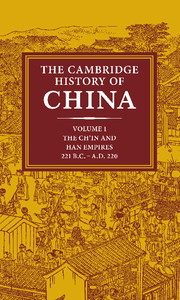Book contents
- Frontmatter
- Introduction
- 1 The state and empire of Ch'in
- 2 The Former Han dynasty
- 3 Wang Mang, the restoration of the Han dynasty, and Later Han
- 4 The conduct of government and the issues at stake A.D. 57–167
- 5 The fall of Han
- 6 Han foreign relations
- 7 The structure and practice of government
- 8 The institutions of Later Han
- 9 Ch'in and Han law
- 10 The economic and social history of Former Han
- 11 The economic and social history of Later Han
- 12 The religious and intellectual background
- 13 The concept of sovereignty
- 14 The development of the Confucian schools
- 15 Confucian, Legalist, and Taoist thought in Later Han
- 16 Philosophy and religion from Han to Sui
- Bibliography
- Glossary-Index
- Map 7 The Han empire, 143 b.c.
- Map 8 The Han empire, 108 b.c
- Map 9 The Han empire, a.d. 2
- Map 12 The Han empire, a.d. 140">
- References
16 - Philosophy and religion from Han to Sui
Published online by Cambridge University Press: 28 March 2008
- Frontmatter
- Introduction
- 1 The state and empire of Ch'in
- 2 The Former Han dynasty
- 3 Wang Mang, the restoration of the Han dynasty, and Later Han
- 4 The conduct of government and the issues at stake A.D. 57–167
- 5 The fall of Han
- 6 Han foreign relations
- 7 The structure and practice of government
- 8 The institutions of Later Han
- 9 Ch'in and Han law
- 10 The economic and social history of Former Han
- 11 The economic and social history of Later Han
- 12 The religious and intellectual background
- 13 The concept of sovereignty
- 14 The development of the Confucian schools
- 15 Confucian, Legalist, and Taoist thought in Later Han
- 16 Philosophy and religion from Han to Sui
- Bibliography
- Glossary-Index
- Map 7 The Han empire, 143 b.c.
- Map 8 The Han empire, 108 b.c
- Map 9 The Han empire, a.d. 2
- Map 12 The Han empire, a.d. 140">
- References
Summary
The collapse of the Han dynasty during the second and third centuries A.D., together with the political, social, and economic troubles that it brought about, resulted in a period of intellectual ferment unequaled in Chinese history except at the end of the Chou period (fourth to third centuries B.C.). the end of the Ming dynasty (sixteenth to seventeenth centuries A.D.), and the revolutions of the twentieth century. During that period certain basic philosophical concepts were evolved that were to be essential to later Chinese thought and to mark it indelibly. When Buddhism was introduced about the beginning of our era and began, from the fourth century onward, to penetrate into the educated elite, it accentuated these changes while at the same time altering their emphasis. Buddhism was adapted to the Chinese mind by a slow process in which it was mingled with and grafted onto Taoism, and it was to dominate “medieval” China until the end of the first millennium.
THE DECLINE OF PHILOSOPHY DURING LATER HAN
The Ch'in and Han dynasties had made China into a unified empire. It had been necessary to introduce a method of centralizing power, and a system of order and authority based on a highly structured administrative and military machine; its ideology had to be essentially pragmatic, somewhat like that of imperial Rome. The metaphysical and mystical tendencies of Taoism and the varied speculations in which older schools of the pre-imperial era had indulged were laid aside in favor of Confucianism. Confucianism is a doctrine of this world, a sociology, and also a cosmology that links man to the universe through the heaven-earth-man triad, yet pays little attention to the ultramundane realms of the supernatural.
- Type
- Chapter
- Information
- The Cambridge History of China , pp. 808 - 872Publisher: Cambridge University PressPrint publication year: 1986
References
- 6
- Cited by

